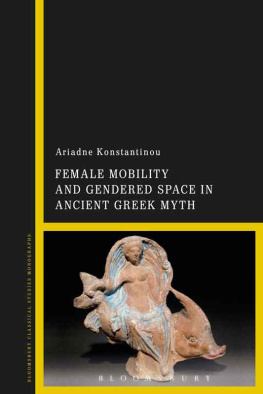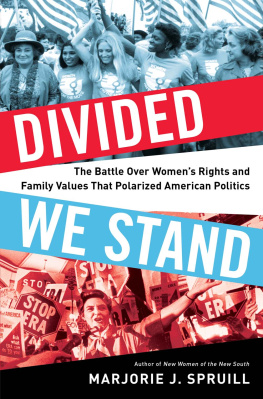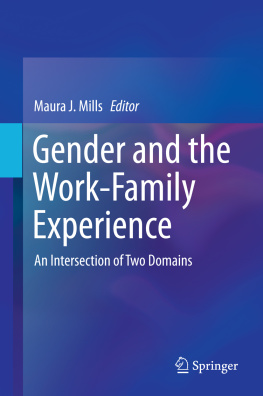A Womans Wage
A
Womans
Wage
Historical Meanings
and
Social Consequences
UPDATED EDITION
ALICE KESSLER-HARRIS
Due to variations in the technical specifications of different electronic reading devices, some elements of this ebook may not appear as they do in the print edition. Readers are encouraged to experiment with user settings for optimum results.
Copyright 1990 by Alice Kessler-Harris
Updated Edition 2014
This book was originally published as part of the Blazer Lecture Series.
Published by the University Press of Kentucky
Scholarly publisher for the Commonwealth,
serving Bellarmine University, Berea College, Centre College of Kentucky, Eastern Kentucky University, The Filson Historical Society, Georgetown College, Kentucky Historical Society, Kentucky State University, Morehead State University, Murray State University, Northern Kentucky University, Transylvania University, University of Kentucky, University of Louisville, and Western Kentucky University. All rights reserved.
Editorial and Sales Offices: The University Press of Kentucky
663 South Limestone Street, Lexington, Kentucky 40508-4008
www.kentuckypress.com
The Library of Congress has cataloged the original edition as follows:
Kessler-Harris, Alice.
A womans wage : historical meanings and social consequences / Alice Kessler-Harris.
p. cm. (The Blazer lectures ; 1988)
Includes bibliographical references.
ISBN 0-8131-0803-9
1. WagesWomenUnited StatesHistory20th century. I. Title.
II. Series
HD6061.2.U6K47 1990
331.4'21'09730904dc20 89-48812
ISBN 978-0-8131-4513-6 (pbk. : alk. paper)
ISBN 978-0-8131-4540-2 (pdf)
ISBN 978-0-8131-4539-6 (epub)
This book is printed on acid-free paper meeting
the requirements of the American National Standard
for Permanence in Paper for Printed Library Materials.
Manufactured in the United States of America.
For Bert
Contents
Foreword
The challenge to undertake a fundamental examination and reappraisal of our institutions, culture, and values prompted the establishment of the Blazer Lecture Series. This series, supported since 1949 by the Paul G. and Georgia M. Blazer Fund, has provided students and faculty of the College of Arts and Sciences at the University of Kentucky the opportunity to host a number of distinguished speakers. The generosity of the Blazer family in establishing and renewing this endowment has long benefited the intellectual atmosphere of the college and the surrounding university community by allowing members of that community to participate in the thoughts and ideas being developed by scholars in a number of disciplines.
In the almost four decades since the Blazer Lecture Series was established, the University of Kentucky has been able to present such distinguished speakers as Henry Steele Commager, the noted historian; Barry Bingham, Sr., of the Louisville Courier Journal; Henry Cabot Lodge, ambassador and senator; and President Gerald Ford.
The continued generosity and interest of the Blazer family have allowed us in recent years to have as lecturers Dr. William DeVries, noted heart surgeon, and Dr. Daniel Boorstin, Librarian of Congress. In cooperation with the University Press of Kentucky, the College of Arts and Sciences is pleased to be able to share the Blazer Lectures through the publication of an annual monograph.
The 1988 Blazer Lectures were given by Dr. Alice Kessler-Harris at the Lexington campus on April 12 and 13, 1988. The topics of her talks were The Battle between Equity and Equality: Historical Perspectives on Justice for Women and The Wage in Context: Gender and the Power to Earn.
The College of Arts and Sciences is pleased to share the ideas of a noted historian through our Blazer Lecture Series monograph. Our pleasure is increased by the knowledge that we have the support of three generations of a distinguished Kentucky family, the Blazers, who recognize the importance of intellectual pursuits as we explore our culture and our society.
Michael A. Baer, Dean
College of Arts and Sciences
University of Kentucky
Introduction
I get paid for what I do here, as far as home it can go, I dont care. I dont get paid to work there.
Cotton mill worker to her foreman
If you dont bring home a paycheck theres no gauge for whether youre a success or not a success. People pay you to work because youre doing something useful and youre good at it. But nobody pays a housewife because what difference does it make.
34-year-old typist
A womans wage is a phrase with particular resonance in the modern period. As women struggle to achieve equality in the labor market, the wages that measure their progress creep frustratingly slowly toward the goal of parity with those of men. At the same time, traditional labor market ideology suggests that wage differentials reflect the choices of individuals. It is not that women choose to be paid less, the argument goes, but that they choose lives that yield less certain rewards in the workplace.
Contemporary feminist scholarship illuminates these arguments by challenging the structures on which they rest. Skeptical of received categories of knowledge, it opens to examination a range of issues that might otherwise remain obscured. In the case of womens aspirations, for example, it asks about the parameters of choice; the ways in which choice is constructed; and the gendered limits placed on its conception. Feminist scholarship operates from the assumption that the traditional belief systems out of which knowledge is constructed place constraints on thought that have real consequences for the behavior of individuals who live within them. If we are to use our knowledge to move to a new plane, we need to dissect seemingly natural meanings and to explore how they function in the real world. These essays are offered as illustrations of how that might be done around the idea of the wage in the twentieth century United States. They seek to explain historical experience by uniting abstract arguments about the nature of meaning with the forceful reality of an idea of the wage that has shaped the lives of millions of American men and women.
Theoretically, the market treats men and women neutrally, judging only the characteristics of their labor. In the world of economists, the wage is rooted in the play of supply and demand. And then, in acquiescence to the knowledge that there are no perfect markets, it is modified. Depending on the school of economists and its location in space and time, an interpreter may see the wage as a product of more or less rigid laws: the press of population; the productivity of industry; the level of social services; the value of the product produced; and the behavior and expectations of workers. These things and more influence economists conception of the wage.
Popular perceptions of the wage are far richer than the descriptions of economists would imply. In the popular mind, the wage has nearly always had an adjective attached. Ideas of a just wage and a fair wage have marked the struggles of working people since the end of the middle ages. In the nineteenth and early twentieth centuries, notions of a family wage and a living wage dominated discussion of the labor market. During the depression of the 1930s, public disapproval attempted to restrict the work of those who earned a luxury wage in favor of those who depended on a necessity wage.








